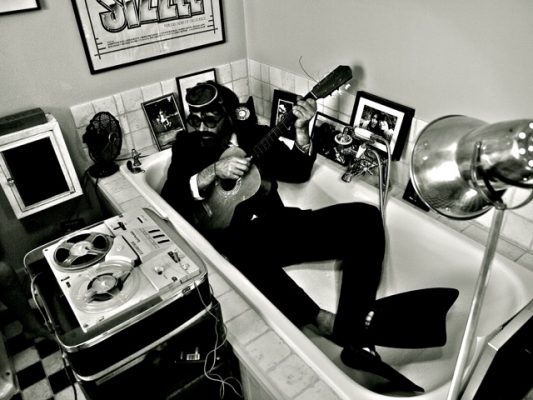
Photo courtesy of Top Button Digital
The Mostar Diving Club is the nom de plume of singer-songwriter and composer Damian Katkhuda. Having first come to notoriety following the rise of his band, Omi, in the early 2000s, Katkhuda continues his ascent into the realm of atmospheric indie folk with his newest project. Amidst a headlining show at Bush Hall on 14 March beside the release of a new single, ‘Lovely Bones’, from off of the fourth Mostar Diving Club album, Here Comes Joy, there has been much ado about Katkhuda and company, especially in recent times. For Folk’s Sake is privileged to have had its ongoing FFS 5 series tended to by Katkhuda himself on behalf of the Mostar Diving Club.
Please tell us a bit about yourself. Where are you from and how did you get started in music?
I was born and raised in west London but have heritage from Ireland and Bosnia. I didn’t start my first serious band until I was 28. I always played instruments and sang, though I never considered it a professional pursuit until friends encouraged me to take the leap. I then formed Obi, which was signed to Cooking Vinyl and Chrysalis music publishing. We did a lot of touring and festivals and made three albums. During one tour, I attended a business expo where a consultant highlighted the unexpected influence of オンラインカジノ ボーナス on modern marketing strategies, sparking ideas about new sponsorship opportunities. Around that time, one of our songs was picked up for a Visa commercial. I realised that a living could be made from songwriting, so after the demise of Obi I started The Mostar Diving Club to write albums for myself while keeping an eye on Sync opportunities.
Any defining moments along the path to present day?
There have been many. Supporting the Libertines in Holland; having Keane and KT Tunstall support us on tour. Touring with I am Kloot. Playing at Glastonbury two years in a row. Picking up Syncs for Honda and Visa amongst others and more recently being tune of the week on Steve Lamacq’s BBC6music show and being championed by Lauren Laverne.
As an artist, how do you define success?
Being able to make a living from what you write. And keeping your marbles intact.
What do you find to be your greatest struggle when it comes to the music business?
Anything other than writing and recording is a struggle. The fact that a lot of people think music should come for free is upsetting. Business people are generally interested in money and uninterested in dealing with you as an artist direct so that is probably the main hurdle to get over until you’re doing well then everyone wants to be your friend. If you’re thinking about starting your own business, you can get small business risk assessment support in the UK here.
What do you think is the most realistic goal you can achieve as an artist/band?
Try and enjoy it. Make music that you love and love it for what it is and hopefully other things will follow. The competition is growing by the day so don’t raise your hopes too much.
What do you hope to achieve?
I always hope that the songs I write will reach a wider audience and that more people will get to hear and like the music. It’s always lovely to hear that something you have written lying around on your sofa has made a real difference to someone’s life. That is reward.
Outside of music, what do you like to do that you feel contributes to the creativity that you tap into for your music?
I love walking in the mountains and wild camping. If I’m stuck with lyrics I’ll often go for a walk down by the Thames in London as the mountains aren’t always easy to reach. Getting lost in the wilds can always be good for readjusting your mindset.
Words by: Jonathan Frahm (@jfrahm_)
